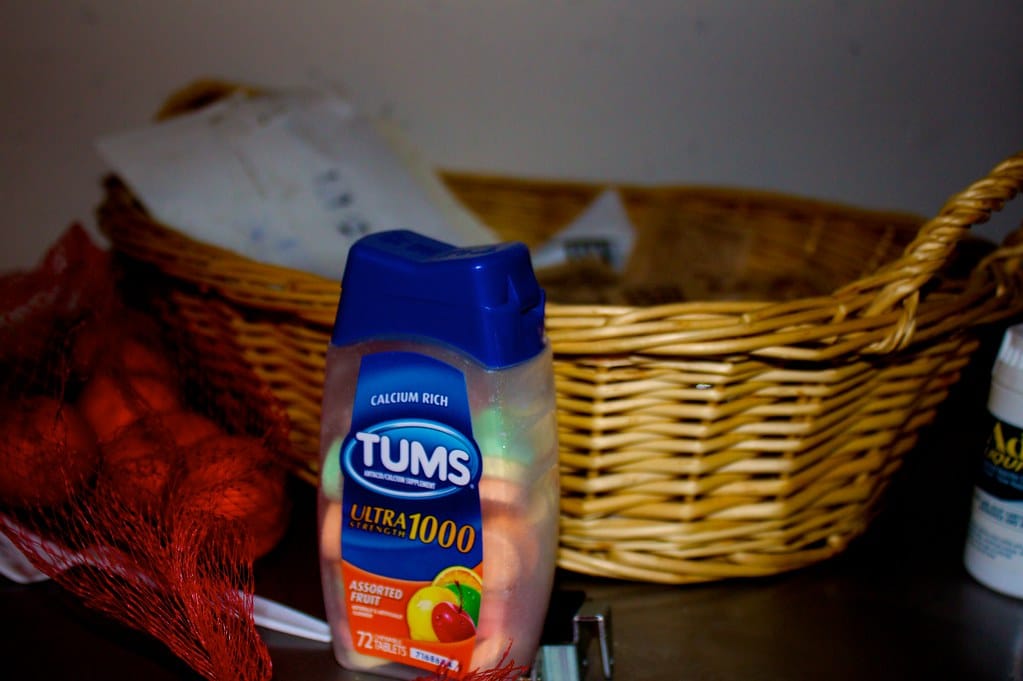Key Takeaways
- Tums are chewable, fruit-flavored tablets taken to relieve the symptoms of heartburn in people.
- Calcium carbonate is the active ingredient in Tums
- Tums aren’t toxic to our fur babies
- Tums can cause signs of tummy upset and constipation in our canine counterparts.
I’m sure we’ve all used Tums at some point in our lives to treat the symptoms of heartburn. Your pooch may have even eaten one sneakily, but this time they’ve eaten the whole bottle (we’re looking at you, Labradors).
The first thing you do is check the ingredients; luckily, there’s no xylitol in there. Tums use sucrose as the sweetening agent in their tablets, so they’re safe.
But what about all the colors and other ingredients? Don’t worry, FluentWoof has you covered. Read on to learn about Tums and whether they’re toxic to our furbabies.
Tums are chewable tablets for humans that use sucrose as a sweetener. Unlike xylitol, sucrose is safe. Tums aren’t toxic to our canine companions but can cause upset tummies and constipation.
How many Tums are toxic to dogs?
Tums are, luckily, safe for dogs. That’s not to say you should give your pooch one, but if he eats one or two, they’re unlikely to cause him any issues.
Though they’re not poisonous if your dog eats a large number of Tums (relative to their size), they can cause gastrointestinal problems or chalky constipation due to the sweetener and calcium carbonate, respectively.
Tums aren’t toxic to dogs. Large numbers of Tums can cause tummy upsets.
What to do if my dog ate Tums?
If you’ve just come home and found your dog has eaten a bottle of Tums, don’t panic! You should just monitor your dog for any signs of gastrointestinal problems such as nausea (licking lips, salivating), diarrhea, or even constipation.
Your dog would be considered constipated if they haven’t had a bowel movement in 24+ hours.
You don’t need to contact your veterinarian if your dog is behaving normally, and the tummy upset should pass within 24 hours. Constipation may persist longer and may require that you contact your DVM to alleviate your pooch’s discomfort.
Your dog shouldn’t need any veterinary intervention unless they develop persistent gastrointestinal signs such as vomiting, diarrhea, or constipation.
When to see a vet?
Even if your dog ate lots of Tums, they shouldn’t need an emergency appointment with your veterinarian. The best thing to do is to watch your dog and perhaps starve them for 6-8 hours to reduce the risk of vomiting after eating Tums.
If your dog develops vomiting or nausea signs (lip licking, grumbly tummy, or excessive drooling), that don’t resolve within 24 hours, then you should make an appointment with your veterinarian. Constipation that also persists would warrant a trip to your veterinarian.
Your dog shouldn’t need to see your veterinarian unless their gastrointestinal signs persist longer than 24 hours.
What if my dog ate plenty of Tums but seems fine?
If your pooch ate lots of Tums and it doesn’t seem to have fazed them, then there’s nothing to worry about.
Tums aren’t toxic to our fur babies, and while some dogs may experience tummy upset, others seem to have iron stomachs and suffer no ill effects from eating a whole bottle of Tums.
Tums aren’t toxic, and if your dog seems completely fine after eating some, then theres no need to worry.
What happens to dogs that eat Tums?
The amount of calcium in the tablets isn’t sufficient to elevate blood calcium levels to dangerous levels, and internal organ injury is highly unlikely.
The calcium, however, can irritate the lining of your dog’s gastrointestinal system leading to nausea, vomiting, diarrhea, or even constipation.
dogs that have eaten Tums may suffer from vomiting, diarrhea, or constipation. Most dogs, however, have no ill effects after eating these tablets, and there’s nothing to worry about.
How do vets treat dogs that have eaten Tums?
As Tums aren’t toxic, your veterinarian isn’t needed in most cases. If, however, your pooch has persistent signs of a tummy upset, then you should contact your DVM for an appointment.
Your vet will treat the vomiting with anti-emetic medications and possibly fluid therapy if your dog is dehydrated.
Diarrhea will be treated with medications such as kaolin to help reduce fluid losses that way, while constipation may be treated with laxatives and anti-inflammatory medications if your dog is painful.
Your dog is unlikely to need your veterinarian’s intervention, and if they do, however, symptomatic treatment is used to reduce vomiting and diarrhea.
Final Woof
So, the good news is Tums aren’t toxic to your furiend, the bad news is they might suffer from an upset tummy or some painful constipation after snacking on a packet.
If this happens, then just withhold food for 6-8 hours after they’ve eaten the Tums to allow any nausea to settle.
Constipation, on the other hand, can be treated at home with some unsweetened pumpkin (not pie filling) in your dog’s food or some mineral or vegetable oil to help soften and lubricate their feces for a couple of days. If signs persist over 24 hours for nausea/vomiting or 48 hours for constipation without improvement, then you should contact your veterinarian.


